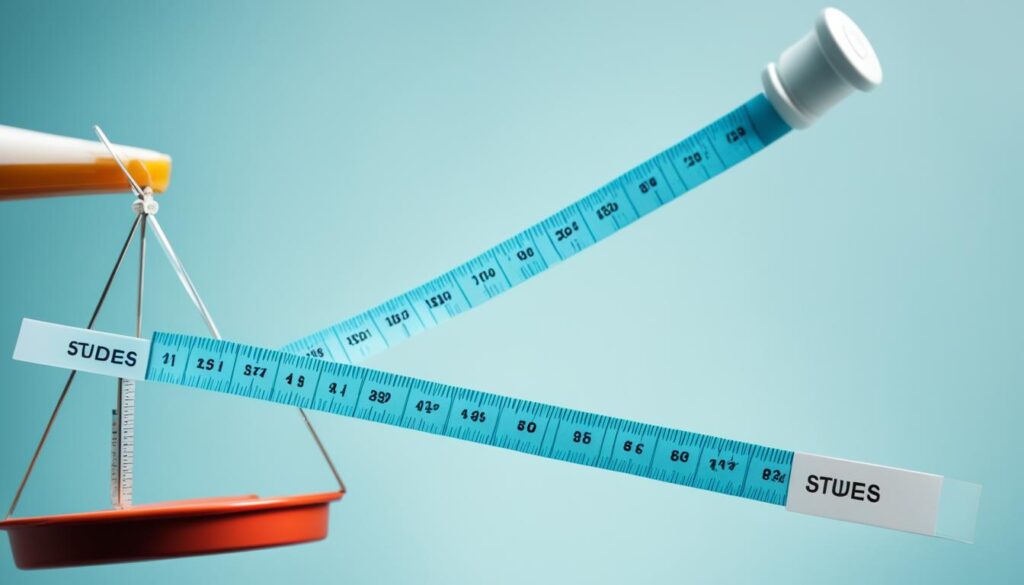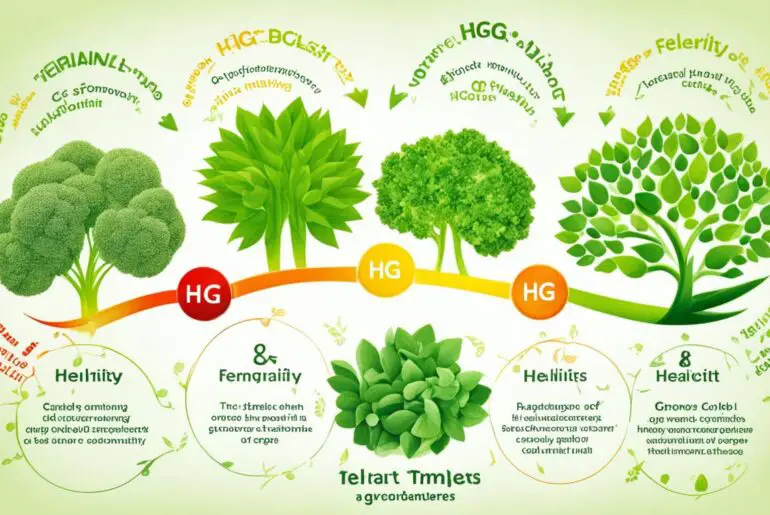Are you struggling to lose weight and looking for a solution that actually works? Have you heard about the HCG diet and wondered if it’s the answer you’ve been searching for? Well, you’re not alone. People all over the world are intrigued by the promises of rapid weight loss with the HCG diet. But does it really live up to the hype? Can the HCG hormone truly maximize weight loss? Let’s dive into the science and explore the truth behind this popular diet.
Key Takeaways:
- The HCG diet involves using the hormone human chorionic gonadotropin to promote weight loss.
- Scientific studies indicate that the weight loss achieved with the HCG diet is mainly due to the calorie restriction rather than the hormone itself.
- The FDA has raised concerns about the safety of HCG diet products, and it is important to consult with a healthcare professional before starting the diet.
- A balanced approach to weight loss, incorporating a nutritious diet and regular physical activity, is essential for long-term success.
- There are alternative weight loss methods that are considered safer and more sustainable than the HCG diet.
The Science Behind HCG Diet
The HCG diet plan is built on the idea of combining the HCG hormone with a very low-calorie diet to achieve rapid weight loss. The HCG injections for weight loss are believed to improve metabolism and prevent muscle loss during the diet. However, scientific studies have shown that the weight loss achieved with the HCG diet is primarily due to the calorie restriction rather than the hormone itself.
Contrary to popular belief, there is no significant evidence to support the claim that HCG injections lead to greater weight loss compared to a calorie-restricted diet alone. The rapid weight loss experienced with the HCG diet can be attributed to the severe calorie restriction, which forces the body to utilize stored fat for energy.
While HCG injections may be a component of the HCG diet plan, it is essential to recognize that the main driver of weight loss is the calorie restriction rather than the hormone itself. Understanding the science behind the HCG diet can help individuals make informed decisions about their weight loss journey.
Phases of the HCG Diet

The HCG diet is a structured program consisting of several distinct phases. Each phase plays a crucial role in maximizing the benefits of the HCG diet and ensuring successful weight loss. Understanding these phases and following the recommended guidelines can help individuals achieve their weight loss goals effectively and safely.
Loading Phase
The first phase of the HCG diet is the loading phase, which typically lasts for two days. During this phase, individuals are advised to consume a high-fat, high-calorie diet. This initial period of indulgence helps prepare the body for the subsequent calorie restriction by building up fat reserves.
While it may seem counterintuitive to consume excess calories at the beginning of a weight loss journey, the loading phase is an essential step in priming the body for fat-burning mode. It ensures that the body has enough energy stored to support vital functions during the calorie-restricted phase.
Weight Loss Phase
The weight loss phase is the core component of the HCG diet. It involves limiting caloric intake to approximately 500-1300 calories per day. This phase typically lasts for a specific duration, depending on individual goals and protocols.
The caloric restriction, coupled with the HCG hormone, triggers the body to utilize stored fat as a source of energy, leading to weight loss. To maintain adequate nutrition, the diet focuses on protein-rich foods, fiber, and vitamin-dense fruits and vegetables.
During this phase, individuals are encouraged to drink plenty of water to stay hydrated, avoid sugary beverages, and follow the recommended food choices to optimize the benefits of the HCG diet. Additionally, regular monitoring and guidance from healthcare professionals can help ensure a safe and effective weight loss journey.
Gradual Increase Phase
The third phase of the HCG diet is the gradual increase phase, which follows the calorie-restricted phase. This phase spans over three weeks and allows for a gradual reintroduction of additional calories into the diet.
During this phase, individuals should focus on slowly increasing caloric intake while emphasizing nutrient-dense, whole foods. Starches and processed foods should be avoided to prevent weight regain and promote a sustainable lifestyle. By gradually reintroducing higher caloric intake, the body adjusts to new eating habits and stabilizes weight loss.
Maintenance Phase
The final phase of the HCG diet is the maintenance phase, which marks the transition to long-term weight management. In this phase, individuals can gradually reintroduce carbohydrates and sugars into their diet while being mindful of their choices.
The maintenance phase aims to strike a balance between enjoying a wider variety of foods and maintaining the achieved weight loss. It emphasizes the importance of adopting healthy eating habits, portion control, and regular physical activity to sustain long-term results.
The HCG diet’s phased approach provides structure and guidance, ensuring individuals have the best chance of maximizing the benefits of the diet. By following each phase’s guidelines and incorporating healthy lifestyle habits, individuals can achieve successful weight loss and long-term weight management.
Effectiveness and Safety of HCG Diet
https://www.youtube.com/watch?v=6ONdxckrYro
The HCG diet has been a subject of debate regarding its effectiveness and safety. While some individuals may experience significant weight loss on the HCG diet, studies have shown that it is primarily due to the calorie restriction rather than the HCG hormone itself.
The FDA has raised concerns about the safety of HCG diet products and issued warnings against over-the-counter HCG products. Side effects such as headache, fatigue, and blood clots have been reported by some individuals.
Before starting the HCG diet, it is important to consult with a healthcare professional to ensure it is safe and suitable for individual needs. They can provide personalized guidance and monitor any potential side effects throughout the diet program.
Table: Pros and Cons of the HCG Diet
| Pros | Cons |
|---|---|
| Can lead to significant weight loss | Potential side effects such as headache and fatigue |
| Structured diet plan | Potential risk of blood clots |
| May provide a jumpstart to weight loss | Calorie restriction can be challenging for some |
| Debate over the effectiveness of HCG hormone |
The table above outlines the pros and cons of the HCG diet, providing a balanced perspective on its potential benefits and drawbacks.
“While the HCG diet may lead to significant weight loss, it is crucial to consider the potential side effects and consult with a healthcare professional before embarking on the diet journey.”
It is essential to prioritize individual health and safety while considering any weight loss program, including the HCG diet.
The Importance of a Balanced Approach

While the HCG diet may offer short-term weight loss, it is vital to adopt a balanced approach to achieve long-term and sustainable results.
A balanced approach to weight loss encompasses incorporating a variety of nutrient-rich foods, engaging in regular physical activity, and practicing mindful eating.
By including foods from all food groups, such as fruits, vegetables, whole grains, lean proteins, and healthy fats, you can ensure that your body receives the necessary nutrients for optimal health and well-being. A balanced diet provides a range of vitamins, minerals, and antioxidants that support overall health and aid in weight management.
Regular physical activity is an essential component of a balanced approach to weight loss. Engaging in activities you enjoy, such as walking, swimming, or cycling, can help burn calories, build muscle, and increase overall fitness levels. Incorporating strength training exercises can also boost metabolism and contribute to a healthy body composition.
Mindful eating is another key aspect of a balanced approach to weight loss. Paying attention to your body’s hunger and fullness cues, eating slowly, and savoring each bite can help prevent overeating and promote a healthier relationship with food.
It is also crucial to consult with a healthcare professional or weight loss expert to develop a personalized weight loss plan that meets your individual needs. They can provide guidance on setting realistic goals, creating a meal plan, and tailoring an exercise routine to your preferences and abilities.
Understanding the Risks and Side Effects
The HCG diet, particularly the low-calorie phase, carries certain risks and side effects. It is essential to be aware of these potential risks and discuss them with a healthcare professional before embarking on the HCG diet.
Potential Risks and Side Effects of the HCG Diet:
- Gallstone formation
- Irregular heartbeat
- Nutrient deficiencies
- Electrolyte imbalances
- Fatigue
- Irritability
- Depression
- Blood clots (reported in some cases)
By understanding these risks and side effects, individuals can make informed decisions about their health and safety. Consulting with a healthcare professional is vital to minimize potential complications and ensure appropriate monitoring during the HCG diet.
Professional Insights:
“It’s crucial to consider the potential risks associated with the HCG diet, especially the low-calorie phase. Some individuals may experience adverse effects, such as nutrient deficiencies, electrolyte imbalances, and irregular heartbeat. It’s always advisable to seek guidance from a healthcare professional before starting this type of diet plan.” – Dr. Sarah Thompson, MD, Weight Loss Specialist
Taking necessary precautions and closely monitoring personal health throughout the HCG diet journey is essential to ensure safety and minimize any negative impacts on the body.
| Risks and Side Effects | Prevention and Management |
|---|---|
| Gallstone formation | Adequate hydration and monitoring gallbladder function |
| Irregular heartbeat | Monitoring heart rate and electrolyte levels |
| Nutrient deficiencies | Working with a healthcare professional to incorporate necessary supplements |
| Electrolyte imbalances | Regular monitoring and balancing electrolyte levels |
| Fatigue, irritability, and depression | Seeking professional support and managing emotional well-being |
| Blood clots (reported in some cases) | Regular check-ups and monitoring for any signs of blood clot-related symptoms |
By understanding the risks and implementing necessary precautions, individuals can pursue the HCG diet with greater confidence, ensuring their well-being remains a top priority.
The Importance of Seeking Professional Guidance
When considering the HCG diet or any weight loss program, it is advisable to seek professional guidance. Consulting with a weight loss doctor or HCG diet professional can provide personalized support and guidance throughout the weight loss journey. These professionals have experience in managing the HCG diet and can help individuals develop a safe and effective weight loss plan. They can also monitor progress, manage any potential side effects, and provide ongoing support to maximize the benefits of the HCG diet.
The Controversy Surrounding HCG Diet

The HCG diet has ignited a heated controversy, with the FDA taking a strong stance against its use due to concerns about legality and safety. Contrary to its proponents, the FDA has issued warnings labeling over-the-counter HCG products as ineffective for weight loss. This controversy stems from the extreme calorie restriction and potential side effects associated with the diet, prompting a deeper examination of its risks and benefits.
When considering the HCG diet, it is crucial to take into account the FDA’s position and consult with healthcare professionals to make an informed decision about its suitability for individual needs. The FDA’s critical standpoint serves as a reminder to approach weight loss practices with caution and seek expert guidance to prioritize personal well-being.
While proponents of the HCG diet argue for its efficacy, the controversy surrounding its use underscores the need for thorough evaluation and consideration of all available information. By consulting with healthcare professionals, individuals can gain a deeper understanding of the potential risks, benefits, and alternatives to the HCG diet, empowering them to make informed choices regarding their weight loss journey.
Alternative Weight Loss Methods

If the HCG diet is not suitable or preferred, there are several alternative weight loss methods that are considered safer and more sustainable. These methods emphasize a balanced and nutritious diet, regular physical activity, portion control, and mindful eating. By adopting these approaches, individuals can achieve long-term, permanent weight loss.
1. Balanced and Nutritious Diet
Eating a balanced and nutritious diet is essential for weight loss and overall health. This involves consuming a variety of nutrient-rich foods such as fruits, vegetables, whole grains, lean proteins, and healthy fats. A diet rich in vitamins, minerals, and antioxidants can support weight loss efforts and provide essential nutrients for optimal functioning.
2. Regular Physical Activity
Incorporating regular physical activity into your routine is crucial for weight loss. Engaging in activities such as brisk walking, jogging, cycling, or strength training can help burn calories, build muscle, and improve overall fitness. Aim for at least 150 minutes of moderate-intensity aerobic activity or 75 minutes of vigorous-intensity activity per week, along with muscle-strengthening exercises on two or more days.
3. Portion Control
Practicing portion control is key to managing calorie intake and promoting weight loss. Be mindful of serving sizes and avoid oversized portions. Use smaller plates, bowls, and utensils to create a visual illusion of a fuller plate. Focus on eating slowly and savoring each bite, allowing your body to register fullness and prevent overeating.
4. Mindful Eating
Mindful eating involves paying attention to the present moment while consuming food. This practice encourages awareness of hunger and fullness cues, helps identify emotional triggers for overeating, and promotes a healthier relationship with food. Slow down, chew your food thoroughly, and savor the flavors and textures. Avoid distractions like watching TV or using electronic devices while eating.
5. Seek Professional Guidance
Working with healthcare professionals, such as doctors, dietitians, or nutritionists, can provide valuable guidance and support in your weight loss journey. These experts can tailor a weight loss plan to your specific needs and goals, monitor your progress, and provide ongoing support. They can also help address any underlying medical conditions that may impact weight loss.
By following these alternative weight loss methods, individuals can achieve sustainable and permanent weight loss while promoting overall health and well-being.
| Weight Loss Methods | Key Benefits |
|---|---|
| Balanced and Nutritious Diet | Provides essential nutrients and supports overall health |
| Regular Physical Activity | Burns calories, builds muscle, and improves fitness |
| Portion Control | Manages calorie intake and prevents overeating |
| Mindful Eating | Enhances awareness of hunger and fullness cues |
| Seeking Professional Guidance | Provides personalized support and expertise |
Conclusion
After reviewing the scientific evidence and considering the potential risks and side effects, it is clear that the HCG diet may not be the best approach for sustainable weight loss. While it may initially produce rapid results, these are primarily due to the severe calorie restriction rather than the HCG hormone itself.
The FDA has expressed concerns about the safety and efficacy of the HCG diet, deeming it illegal and dangerous. Therefore, it is essential to explore safer and more sustainable weight loss methods that prioritize overall health and well-being.
Seeking professional guidance from healthcare professionals, such as weight loss doctors or HCG diet professionals, can help individuals develop personalized weight loss plans. These experts can provide the necessary support, monitor progress, and address any potential side effects. A balanced and individualized approach to weight loss, incorporating a nutritious diet, regular physical activity, and mindful eating, is key to long-term success.
In conclusion, while the HCG diet may offer short-term weight loss, it is important to consider the scientific evidence, potential risks, and expert guidance. Taking a comprehensive and balanced approach to weight loss is vital for achieving sustainable results and promoting overall well-being.
FAQ
What is the HCG diet?
The HCG diet involves using the hormone human chorionic gonadotropin to promote weight loss. It is a protocol that combines the hormone with a very low-calorie diet.
How does the HCG diet work for weight loss?
The HCG hormone is believed to boost metabolism and prevent muscle loss. However, scientific evidence suggests that the weight loss achieved with the HCG diet is primarily due to the severe calorie restriction.
What are the phases of the HCG diet?
The HCG diet consists of several phases, including the loading phase, calorie-restricted phase, gradual increase in caloric intake, and maintenance phase.
Is the HCG diet effective for weight loss?
While some individuals may experience significant weight loss on the HCG diet, studies have shown that it is primarily due to the calorie restriction rather than the HCG hormone itself.
What is the importance of a balanced approach in weight loss?
A balanced approach to weight loss includes incorporating a variety of nutrient-rich foods, regular physical activity, and mindful eating. It promotes long-term and sustainable results.
What are the risks and side effects of the HCG diet?
The HCG diet carries potential risks and side effects, including gallstone formation, irregular heartbeat, nutrient deficiencies, electrolyte imbalances, fatigue, irritability, and depression.
Why is it important to seek professional guidance for the HCG diet?
Consulting with a weight loss doctor or HCG diet professional can provide personalized support, help manage potential side effects, and ensure a safe and effective weight loss plan.
What is the controversy surrounding the HCG diet?
The FDA has deemed the HCG diet illegal and unsafe. Over-the-counter HCG products have been labeled as ineffective for weight loss. It is essential to consider the FDA’s stance and consult with healthcare professionals before starting the HCG diet.
What are the alternative weight loss methods to the HCG diet?
Safer and more sustainable weight loss methods include adopting a balanced and nutritious diet, engaging in regular physical activity, portion control, and mindful eating.
What is the conclusion regarding the HCG diet?
The weight loss achieved with the HCG diet is primarily due to severe calorie restriction, and there are potential risks and side effects. It is important to consider safer and more sustainable weight loss methods and consult with healthcare professionals for personalized guidance.




